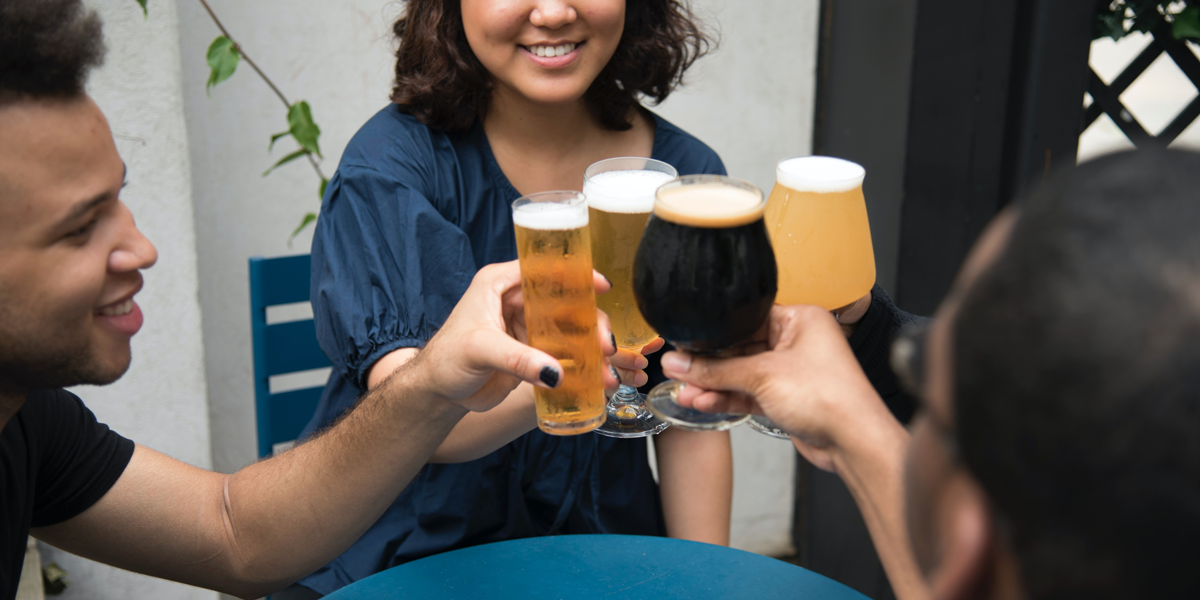
The ethics of workplace drinks, when we’re collectively drinking less
Opinion + AnalysisHealth + WellbeingBusiness + Leadership
BY Nick Jarvis 30 NOV 2023
There is no denying that alcohol is inextricably linked to Australia’s social DNA. Going to the pub with mates, drinking at a BBQ or picnic, at dinner parties, house parties, birthdays or gigs – all of these link “having a drink” with “having a good time” in our national consciousness.
A Roy Morgan research study in 2022 found that the majority (67.9%) of Australians had consumed alcohol in the last month, with the average Australian consuming nearly 10 litres of pure alcohol a year (2017-18 study).
In fact, a 2021 survey named Australians the heaviest binge drinkers in the world, finding we would binge an average of 27 times a year, almost double the global average – although overall alcohol consumption rates have been dropping since the early 2000s.
When it comes to work, alcohol is closely tied to socialising – Friday after work drinks, celebratory drinks to recognise a goal achieved, Christmas parties, launches, networking events; all of them invariably involve alcohol in some capacity. Some people might even say they can’t stomach a work social event unless alcohol is involved.
In some cultures binging is even built into work culture – in China, heavy drinking after a deal has been sealed is a time-honoured ritual, where everyone involved has to let their guard down and form a “moral contract” bound by heavy drinking together. In Japan, nomikai, or drinking parties, are an integral part of workplace culture for socialising and bonding, and everyone is expected to take part.
Alcohol certainly has its benefits as a social lubricant at work events, allowing people to bond together faster, but it also has its dark side – harassment after the lowering of inhibitions, saying something inappropriate to a colleague, potentially embarrassing yourself in front of your team or clients, even assault can follow heavy drinking with work mates.
Having work social rituals based around the consumption of alcohol is also exclusionary for those who choose not to drink, whether because of physical or mental health reasons, religious or cultural reasons, or because they’ve quit or just don’t want to. People may feel pressured to drink in work social spaces, to be social, to network and keep up with the team. A 2019 survey by the UK’s Drinkaware found that more than half of workers surveyed would like there to be less pressure to drink at work events.
And people are increasingly opting out of alcohol-fuelled leisure time, a trend led by the more risk-aware Gen Z. The 2019 National Drug Strategy Household Survey found that, in 2001, the people most likely to have consumed alcohol daily, used illicit drugs or smoked cigarettes were in their 20s. By 2019, that had changed to people in their 40s and 50s. The survey also found the number of people in their 20s who don’t drink at all increased from 9% to 22% between 2001 and 2019.
The drinks industry has adapted, with sales of zero alcohol substitutes rising over 100% in the two years to 2022, but in many cases our workplaces have not.
As more people are becoming ‘sober curious’, or trying to reduce their alcohol intake, it can make it awkward in the workplace when you decline an “al-desko” beer or to troop along to Friday after work drinks. Missing out on socialising with your colleagues can also be a barrier to making closer connections and friendships.
So what responsibility do workplaces have to their employees to offer alcohol free options for socialising, while also respecting the rights and choices of employees who want to drink responsibly?
Employers are mandated ethically and legally to provide safe, inclusive workplaces, and this should include respecting people’s decision to either drink alcohol or not drink alcohol and still be able to participate socially with their workmates and colleagues.
Rather than banning alcohol at work, providing zero alcohol drink options and alcohol-free bonding activities are an easy way employers can foster an inclusive environment, while respecting individual choice.
Just as we’ve seen the “smokers huddle” outside office buildings dwindle to near invisibility in the past ten years, I predict that we’ll soon see a marked increase in the availability of non-alcoholic options at work events and alternative socialising options that don’t come with any pressure, latent or otherwise, to imbibe. Which can only be a good thing for our livers and work-related hangxiety.

BY Nick Jarvis
Nick Jarvis is a Sydney-based editor and writer on the arts, culture and technology. He's written for The Ethics Centre, the Walkleys, Sydney Festival, Sydney Film Festival, Vice and many Australian arts organisations. He currently works for Sydney Festival.
Ethics in your inbox.
Get the latest inspiration, intelligence, events & more.
By signing up you agree to our privacy policy
You might be interested in…
Opinion + Analysis
Business + Leadership
Georg Kell on climate and misinformation
Opinion + Analysis
Business + Leadership
The great resignation: Why quitting isn’t a dirty word
Opinion + Analysis
Business + Leadership
Moral injury is a new test for employers
Opinion + Analysis
Business + Leadership




